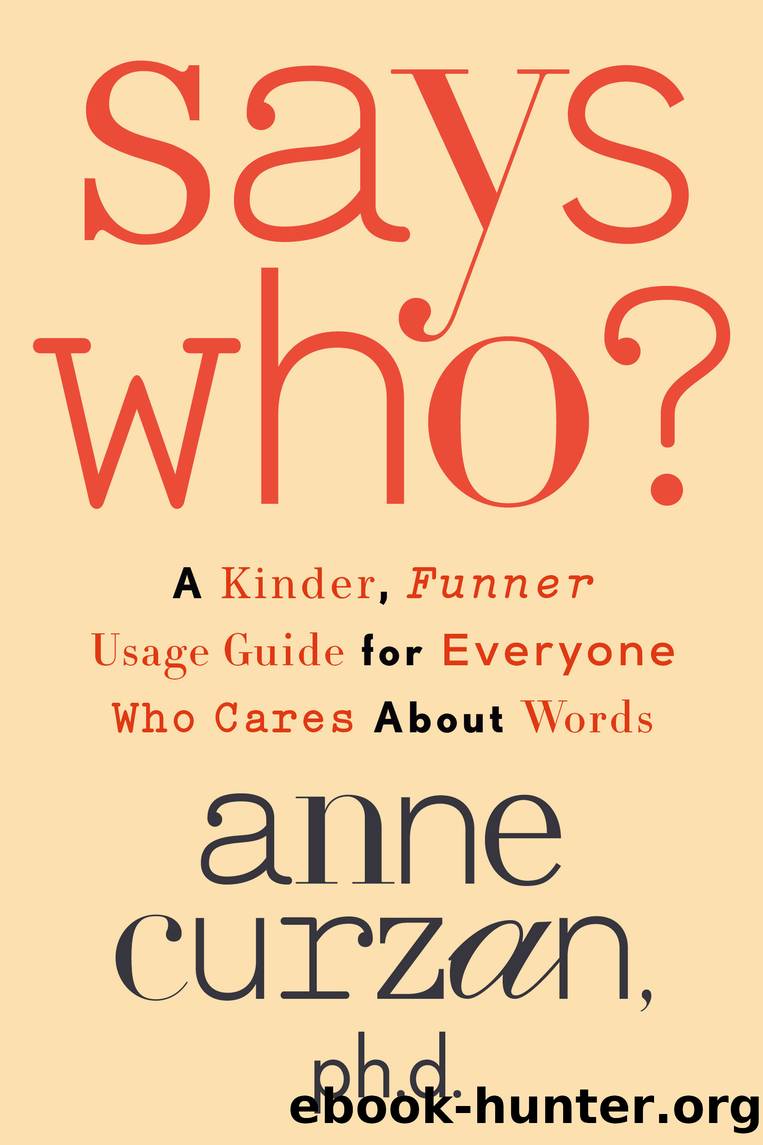Says Who? by Anne Curzan

Author:Anne Curzan [Curzan, Anne]
Language: eng
Format: epub
Publisher: Crown
Published: 2024-03-26T00:00:00+00:00
IT IS I
As I mentioned in the introduction, I was taught it was proper grammar to respond, âThis is she speakingâ if someone called and asked, âIs Anne there?â Never mind that this felt over-the-top formal to me and my sisters.
But is it proper grammar? The basis for the prescription goes as follows. To be is a linking verb. Linking verbs roughly equate, semantically, the subject with the predicate noun phrase or adjective phrase that follows it. (If Anne is a wordie: Anne = wordie.) Linking verbs must also, then, equate the subject and the predicate noun phrase grammatically. So, given that the subject is in the nominative case (e.g., I, she, we), then the predicate noun must also be in the nominative case (e.g., âIt is I,â âThis is she speakingâ).
Why does it sound so odd, then, to say, âIt is we,â rather than âIt is usâ? And while weâre at it, hereâs another awkward sentence: âI asked who called yesterday, and it was he.â My gut wants to say âIt was him,â just like I want to say âItâs meâ when someone asks for me on the phone. At the same time, my inner grammando channels my mother and winces.
If you have a similar battle going on in your head, hereâs the good news: Many usage guides now say that both âIt is meâ and âIt is Iâ are acceptable. It is, rather than an issue of grammaticality, an issue of formality. If your inner grammando is not convinced that âItâs meâ could possibly be grammatical, remind it that other languages show the predicate noun doesnât need to be nominative. In French, for example, it is only grammatical to say âCâest moiâ (âIt is meâ), not âCâest jeâ (âIt is Iâ). Joseph Priestley, the descriptively inclined grammarian I mentioned earlier in this chapter, brought up exactly this example from French in the 1700s to defend âItâs meâ in English.
Did you, like me, learn that you should say âSheâs taller than Iâ rather than âSheâs taller than meâ? Either is fine. The question is whether we interpret than as a subordinating conjunction or a preposition. If itâs a subordinating conjunction, the argument is that the full sentence is âSheâs taller than I am,â so when it is shortened, it becomes âSheâs taller than I.â But than can also function as a preposition (in which case it takes the object case), and there isnât an especially compelling reason not to let it be a preposition here, so âSheâs taller than me.â There are occasionally sentences where there will be ambiguityâfor example, âMy father called my sister after me.â After can also be a subordinating conjunction or a preposition. So the question is: Did your father call your sister after you called your sister or after he called you? My best advice here: Rather than trying to legislate that everyone, all the time, use than and after and the like as subordinating conjunctions in these constructions, reword the sentence if it might be ambiguous.
Download
This site does not store any files on its server. We only index and link to content provided by other sites. Please contact the content providers to delete copyright contents if any and email us, we'll remove relevant links or contents immediately.
Cecilia; Or, Memoirs of an Heiress — Volume 1 by Fanny Burney(32536)
Cecilia; Or, Memoirs of an Heiress — Volume 2 by Fanny Burney(31933)
Cecilia; Or, Memoirs of an Heiress — Volume 3 by Fanny Burney(31925)
The Lost Art of Listening by Michael P. Nichols(7485)
Asking the Right Questions: A Guide to Critical Thinking by M. Neil Browne & Stuart M. Keeley(5751)
We Need to Talk by Celeste Headlee(5604)
On Writing A Memoir of the Craft by Stephen King(4924)
Dialogue by Robert McKee(4385)
Pre-Suasion: A Revolutionary Way to Influence and Persuade by Robert Cialdini(4208)
I Have Something to Say: Mastering the Art of Public Speaking in an Age of Disconnection by John Bowe(3871)
Elements of Style 2017 by Richard De A'Morelli(3336)
The Book of Human Emotions by Tiffany Watt Smith(3287)
Fluent Forever: How to Learn Any Language Fast and Never Forget It by Gabriel Wyner(3071)
Name Book, The: Over 10,000 Names--Their Meanings, Origins, and Spiritual Significance by Astoria Dorothy(2967)
Why I Write by George Orwell(2944)
Good Humor, Bad Taste: A Sociology of the Joke by Kuipers Giselinde(2939)
The Art Of Deception by Kevin Mitnick(2784)
The Grammaring Guide to English Grammar with Exercises by Péter Simon(2733)
Ancient Worlds by Michael Scott(2672)
